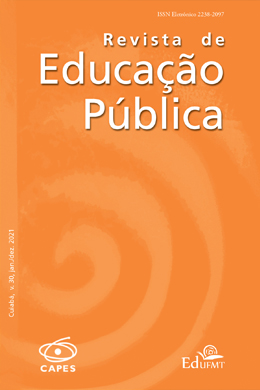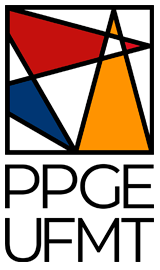O CONHECIMENTO DOS TEMAS NO ENSINO DA REPRODUÇÃO DAS PLANTAS
DOI:
https://doi.org/10.29286/rep.v30ijan/dez.9253Palavras-chave:
Biologia, Educação, Ciência, Conhecimento especializado dos professoresResumo
Apresentam-se os resultados da investigação desenvolvida em salas de aulas portuguesas de 3º e 6º ano que identificam as dimensões que integram o conhecimento dos tópicos (conteúdo), do professor, ensinando reprodução das plantas. Para o efeito realizaram-se gravações em vídeo e áudio. A informação foi tratada com análise de conteúdo e contrastada com a literatura existente numa perspectiva metodológica de Top-down Bottom-up. Foram identificados cinco aspetos de diferentes naturezas, relacionadas com o conhecimento dos tópicos. i)conceitos da biologia e de exemplos associados; ii)leis, princípios e teorias da biologia; iii)procedimentos e técnicas de observação em biologia; iv)modelos relacionados com o conceito da biologia e v)factos e fenômenos biológicos.
Downloads
Referências
ABD-EL-KHALICK, F.; LEDERMAN, N. Improving science teachers’ conceptions of nature of science: a critical review of the literature. International Journal of Science Education, 22(7), 2000. 665-701.
ALAKE-TUENTER, E. et al. Inquiry-based science teaching competence of primary school teachers: Delphi study. Teaching and Teacher Education, 35, 2013. 13-24.
ANDERSON, E. H.; SPENCER, M. H. COgnitive representation of AIDS. In: CRESWELL, J. W. Qualitative inquiry & research design. Chosing among five approaches. 2a. ed. London: Sage Publication, p. 259-283.
ARKSEY, H.; KNIGHT, P. Interviewing for social scientist. London: Sage Publication, 1999.
BARDIN, L. Análise de conteúdo. Lisboa: Edições 70, 2012. BRYMAN, A. Social Research Methods. 4º. ed. USA: [s.n.], 2012.
BRYMAN, A. Social Research Methods (4th edition). USA: Oxford University Press, 2012.
CARRILLO, J. et al. The mathematics teacher’s specialised knowledge (MTSK) model. Research in Mathematics Education, 20 (3), 2018. 236-253.
CHEVALLARD, Y. La transposition didactique. Grenoble: Chevallard, Y. (1985). La transposition didactique. Grenoble: La Penseé Sauvage., 1985.
ESCUDERO-ÁVILA, D. Una caracterización del conocimiento didáctico del contenido como parte del conocimiento especializado del profesor de matemáticas de secundaria. Tesis doctoral. Huelva: [s.n.], 2015.
GESS-NEWSOME, J. A model of teacher professional knowledge and skill including PCK: Results of the thinking from the PCK Summit. In: BERRY, A.; FRIEDRICHSEN, P.; LOUGHRAN, J. Re-examining Pedagogical Content Knowledge in Science Education. London: Routledge, 2015. p. 28-42.
GRBICH, C. Qualitative data analysis: An introduction. 2º. ed. California: Sage Publication, 2013.
GROSSMAN, P. L. The making of a teacher: Teacher knowledge and teacher education. New York: Teachers College Press, 1990.
HARLEN, W. Enseñanza y aprendizaje de las ciencias. Madrid: Ediciones Morata S. L., 2003.
HODSON, D. Is this really what scientist do? In: WELLINGTON, J. Practical work on school science. Which way now? Londres: Routedge, 1998. p. 93-108.
KRIPPENDORF, K. Content analysis: An introduction to its methodology. Los Angeles: Sage Publications, 2018.
LEITE, L. Contributos para uma utilização mais fundamentada do trabalho laboratorial no ensino das ciências. In: CAETANO, H.; SANTOS, M. Cadernos didáticos de ciências. Lisboa: Ministério da Educação, Departamento do Ensino Secundário, 2001. p. 77-96.
LORENZANO, P. Leis e teorias em biologia. In: ABRANTES, P. C. Filosofia da biologia. Porto Alegre: Artmed, 2011. Cap. 3, p. 53-82.
LOUGHRAN, J.; BERRY, A.; MULHALL, P. Understanding and developing
science teachers’ pedagogical content knowledge. In: Professional
Learning. 2º. ed. Rotterdam: Sense Publishers, v. 12, 2012. p. 15-23.
LUÍS, M. A. O Conhecimento Especializado do Professor quando ensina Tópicos de Biologia. Documento inédito: [s.n.], 2019.
LUÍS, M.; MONTEIRO, R.; CARRILLO, J. Conhecimento especializado do professor para ensinar ciências. Livro de resumos do XVI encontro nacional do ensino das ciências. A ciência como cultura. Lisboa: [s.n.]. 2015. p. 690-693.
MAGNUSSON, S.; KRAJCIK, J.; BORKO, H. Nature, sources, and development of pedagogical content knowledge for science teaching. In: GESS-NEWSOME, J.; LEDERMAN, N. G. Examining pedagogical content knowledge: The construct and its implication for science education. Dordrecht: Kluver Academic, 1999. p. 95-132.
MONTEIRO, R.; LUÍS, M. I know. i teach. Conhecimento especializado do professor. Encontro Regional de Professores de Matemática. São Brás de Alportel, Faro, Portugal: [s.n.]. 2016.
MUÑOZ-CATALÁN, M. C.; MONTEIRO, R. Afrontando la controversia en la investigación cualitativa. Discusión sobre la naturaleza de los elementos metodológicos en la investigación en educación. Revista Interdisciplinar de Ciências e Artes, 4, 2016. 23-30.
NATIONAL RESEARCH COUNCIL. The role os theory in advancing 21st-century biology. Washington. 2007.
NIEUWENHUIS, J. Qualitative research design and data gathering techniques. In: MAREE, K. First steps in research. Pretoria: Van Schaik, 2007.
NITZ, S.; NERDEL, C.; PRECHTL, H. Language in science education and the influence of teachers’ professional knowledge. In: TASAR, M. F.; CAKMAKCI, G. Contemporary science education research: pre-service and in-service teacher education. [S.l.]: [s.n.], 2010. p. 323-329.
NOVAK, J.; GOWIN, D. B. Aprender a aprender. Tradução de Carla Valadares. Lisboa: Plátano Edições Técnicas, 1996.
OGDEN, R. The sage encyclopedia of qualitative research methods. London: Sage, 2008.
PARK, S. et al. Is pedagogical content knowledge necessary for reformed science teaching? Evidence from an empirical study. Research in Science Education, 41(2), 2011. 245-260.
PARK, S.; CHEN, Y. Mapping out the integration of the components of pedagogical content knowledge (PCK): Examples from high school biology classrooms. Journal of Research in Science Teaching, 49(7), 2012. 922–941.
PARK, S.; OLIVER, J. S. Nacional Board Certification (NBC) as a catalyst for teacher’s learning about teaching: The effect of the NBC process on candidate teachers’ PCK development. Journal os Research in Science Teaching, 45(7), 2008. 812-834.
PARK, S.; OLIVER, J. S. Revisiting the conceptualisation of pedagogical content knowledge (PCK): PCK as conceptual tool to understand teachers as professionals. Researcher in Science Education, 38, 2008. 261-284.
PARK, S.; OLIVER, J. S. Mapping out the integration of the components os pedagogical content knowledge (PCK): Examples from high school biology classrooms. Journal os Research in Science Teaching, 49(7), 2012. 922-941.
PATTON, M. Q. Qualitative research and evaluation methods. 3º. ed. Thousand Oaks: [s.n.], 2002.
ROCHELLE, J. Choosing and using video equipment for data collection. In: KELLY, A.; LECH, R. Hanbook os research design in mathematics and science education. London: Lawrencee Erlbaum Associates Publishers, 2000.
SHULMAN, L. S. Those who understand: Knowledge growth in teaching.
Educational Researcher, 15(2), 1986. 4-14.
SHULMAN, L. S. Knowledge and teaching: Foundation of the new reform.
Harvard Educational Review, 57(1), 1987. 1-22.
SILVA, E. A. As metodologias qualitativas de investigação nas ciências socias.
Revista Angolana de Sociologia, dez. 2013. 77-99.
STAKE, R. Case studies. In: DENZIN, N. K.; LINCOLN, Y. S. Strategies of qualitative inquiry. 3a. ed. Thousand Oaks: Sage publications, 2005. p. 443-466.
VAN-DIJK, E. M.; KATTMAN, U. A research model for the study of science teachers PCK and improving teacher education. Teaching and Teacher Education, 23, 2007. 885-897.
VAN-DRIEL, J. H.; VERLOOP, N.; DE VOS, W. Developing science teachers’ pedagogical content knowledge. Journal of Research in Science Teaching, 35(6), 1998. 673–695.
VERDUGO-PERONA, J. J.; SOLAZ-PORTOLEZ, J. J.; SANJOSE-LOPEZ, V.
Conhecimento pedagógico do conteúdo nas ciências: estado da arte. Cadernos de Pesquisa (online), 47(164), 2017. 586-611. Disponivel em: <http://www.scielo. br/scielo.php?pid=S0100-15742017000200009&script=sci_abstract&tlng=pt>. Acesso em: 2019.
WATT, J. H.; VAN DEN BERG, S. Elements os scientific theories: concepts and definitions. In: Reseach Methods for Communication Science. Boston: Allyn and Bacon, 2002. Cap. 2, p. 11-22.






















































